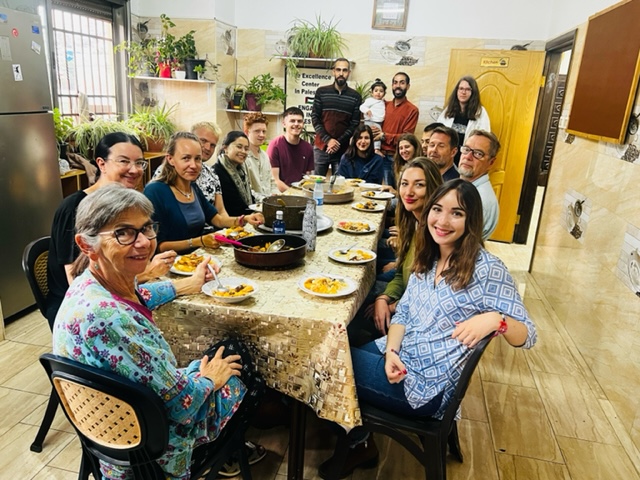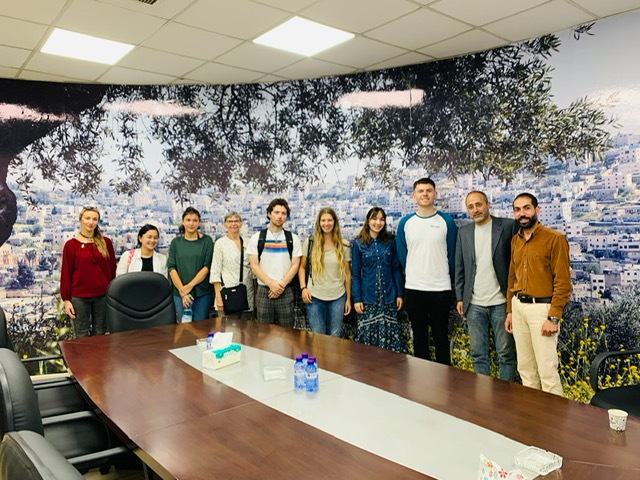Human Rights Program Review
Ratings
Review
My name is Josie, and I am a twenty-year-old undergraduate student from Germany. I study Middle Eastern Studies and Economics. Because of that I took the opportunity to come to Palestine during my summer holidays. I participated in the Human Rights Program for two months. In the course of the program, I learned about human rights in Palestine through a presentation and visits to different institutions in Hebron. Furthermore, I received Arabic lessons and taught some English.
The center organized a lot of visits to different institutions and places. I had the chance to talk to government employees, doctors, teachers, journalists, activists and other interesting people. It was great to get an overview over the human rights situation in Palestine and the obstacles that Palestinians face on a daily basis. However, time restrictions and the language barrier sometimes made it hard to talk about topics in depth. Still, I learned a lot about the occupation and the situation in Palestine.
My favorite visit was to the Bedouin villages of Masafer Yatta. We visited several of them and talked to the families about their living conditions and how the occupation affects them. Some other institutions I visited were the Chamber of Commerce, the Hebron Municipality and the office of UNRWA at the Fawwar refugee camp.
Living with a host family was a great experience. Me and another volunteer stayed in a little flat inside the family´s house. We shared a bedroom, a bathroom and a small living room. That way we had privacy while also being close to the family. The only inconvenience to that living arrangement was that we didn´t have a kitchen in our flat. We only had a water cooker and a small fridge. So, the nights when we didn´t have dinner with the host family, we weren´t able to cook ourselves.
Most members of the host family didn´t speak any English. It was great to practice speaking Arabic but sometimes caused misunderstanding and made it hard to communicate important things. Luckily, the staff at the center was very helpful when it came to translating or clearing up any issues.
The host family was incredibly kind, and I loved spending time with them. All the members welcomed me warmly and made me feel like a part of the family. They made a big effort to talk to me despite the language barrier. Through a combination of my broken Arabic, their little English, Google Translate and a lot of gestures, we managed very well. I am incredibly glad to have gotten the opportunity to get to know them and to stay with them. Their hospitality was amazing. When my mother visited for a week, they even let her stay in their house as well. The two months I spent with them gave me an invaluable insight into Palestinian day-to-day life and they taught me a lot. I will definitely come back to visit them.
I received two ninety-minute lessons of Arabic per week. The first three weeks me and another volunteer had our lessons together, but after she left, I received single lessons. Even though I had taken one year of Modern Standard Arabic in university before, it was challenging to learn the Palestinian dialect. The grammar is easier but different and some letters are pronounced differently. The focus of the lessons was on speaking which was very useful and helped me with communicating with people here. I really enjoyed the lessons and the challenge of studying Ammiya.
The employees at the center were great. They were very kind and took the time to help with problems and answer questions about Palestinian culture. Having so many students at the center was nice because they were very eager to practice their English and willing to help us with Arabic in return.
I had never taught English before, so I was a little thrown to be put in front of a class without any preparation and the first time even without forewarning or the time to prepare something. Especially knowing that the students paid for the classes when I was clearly not qualified to teach them, made me uncomfortable. It was a learning curve for both the students and me. I have to say that I will probably not teach English again in the future, but it was a challenge and it was good to try it out.
I used seven of my eight weekends to travel to other cities. The services (small 7 seat buses that drive without a set route or schedule) that operate inside the Westbank made it possible to travel safely and for a very affordable price. I used them to go to Bethlehem, Jerusalem, Jericho, Nablus, and Ramallah. The bus and train system in Israel made it possible to visit cities there as well, so I went to Akko, Haifa, Tel Aviv and Eilat.
Before coming here, I had some concerns about safety in the Westbank. However, during my stay I felt very safe. The people here, especially in Hebron, are very curious about foreigners, so they sometimes stared but not in a bad way. Because of their curiosity people here are very eager to talk to foreigners (and also to sell stuff to them). Whenever I asked for directions, they were very helpful and kind. Even walking alone at night, I felt safe. There were two instances when men followed me and my friends and made us uncomfortable but that could have happened just as well in any European city.
The military presence of the Israelis was very noticeable with all the checkpoints, but they never caused any problems for me or any other foreigners. Even when there were clashes between Palestinians and the Israeli military, they were restricted to small areas, and I only ever heard about it in the news.
Overall, I had a great time in Hebron. Not only did I learn a lot about Palestinian culture and the occupation, but I also learned a lot about hospitality, kindness and resilience. It was an incredible experience and I´m very glad that I came here. I will cherish the memories of my stay here and the people I met.
Media


